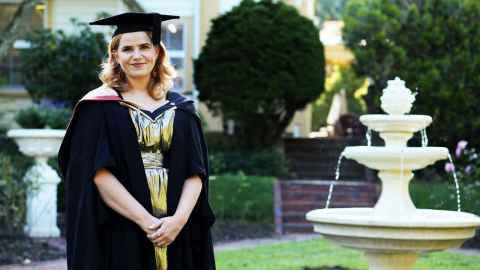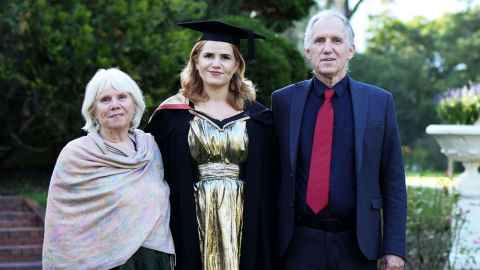Heart-warming tale the focus of graduate's thesis
13 May 2025
The lives of homeless people with pet dogs attracted the attention of dog-lover Sophie Scott-Elvidge, who is graduating with a Master of Social and Community Leadership from the University of Auckland.

Having dogs, as many pet owners would know, can be a barrier to finding housing at the best of times, and no dog owner wants to leave their animal behind.
The situation is even more difficult for people without a home; living on the street or in their cars, as University of Auckland masters graduate Sophie Scott-Elvidge discovered when she decided to base her masters thesis on the issue.
Sophie, who has balanced study with a full-time job in the University’s Schools and Community Engagement team, is delighted, and somewhat surprised, to graduating in the autumn ceremony with a first-class degree.
“I’ve always loved learning, but I wasn’t a particularly strong student in high school. I’d never have thought that I’d be graduating with a research masters and first-class honours.”
She says teachers often told her she had potential but that she struggled to focus and apply herself.
“That changed when I began my undergraduate degree in communications at Unitec, where I really hit my stride. I especially enjoyed a small research project I did on shark finning and the role media campaigns play in public awareness, which unexpectedly sparked a love of research.”
She says starting work at the University of Auckland in 2017, initially in postgraduate student advisement at the University’s Epsom Campus, was a huge part of what helped her develop the confidence to pursue further study.
“It was there that I first came across the Master of Social and Community Leadership and was inspired by both the work of the students and the programme leader, Associate Professor John Fenaughty.”
She says the students’ commitment to driving change in their workplaces and communities really resonated with her, and she applied for the programme in 2021.
“Covid-19 also factored into my decision to stop just thinking about studying and just go for it. The challenges and uncertainties it brought gave me a new perspective on life and my goals and made me realise the importance of taking up opportunities when they arise.”
The programme encouraged her to think deeply about social innovation and the kind of leader she wanted to be, she says.
“My thesis was inspired by my sister-in-law’s work with Street Paws in the UK, an organisation that provides outreach and advocacy for homeless dog owners, offering things like free veterinary services, donated dog food, warm clothing etc.”
Sophie’s thesis explored how pet ownership can be a barrier, and sometimes and enabler, for homeless people accessing housing and social support, an issue she felt hadn’t received enough attention.

“I soon realised it was ethically problematic for me to just bowl up to people living on the street who had animals and have a chat, so for my thesis, I ended up speaking directly to one woman and two men (from Auckland) who had been homeless or in a car, but had later found accommodation that accepted their animals.”
She also did a wider review of the literature on the issue internationally before coming to her conclusions.
“I found having dogs is definitely a barrier to housing for people living rough, but on the other hand, they offer huge benefits in terms of emotional support, and also a reason to get up in the morning and have some routine and stability.
“And for women living on the street for example, dogs are also a protection against sexual violence, which is one of the biggest dangers for them.”
She says some people’s assumptions that animals in that situation might suffer from mistreatment is not borne out in the literature or her own research.
“Quite the opposite in fact. People would routinely feed their dogs before themselves for example, even if it meant going hungry, and were totally devoted to them.”
She also discovered how fearful people were of having their animals taken away, which became a barrier to accessing services.
“This would stop dog owners from wanting to be visible anywhere their dogs weren’t allowed, even if they would really benefit from accessing that help.”
She says studying part time while working full time was only possible because of the flexibility of her managers and team at the University, especially as in her current role as a regional recruitment adviser, she has to travel so much nationally.
“Our busiest time happened to fall just before my thesis deadline, but the support of my team and family got me through. I had to become very structured and intentional with my time, which didn’t come naturally, but I learned a lot about setting boundaries and communicating clearly.”
I found having dogs is definitely a barrier to housing for people living rough, but on the other hand, they offer huge benefits in terms of emotional support, and also a reason to get up in the morning and have some routine and stability.
Studying while working has made her more focused, reflective and resilient, she believes.
“I hope to use what I’ve learned to support others on their learning paths and to advocate for inclusive, community-focused solutions to complex social issues. I’m also interested in pursuing further study, but I’m giving myself some space to reflect and develop my ideas first.”
Her own dream project would be to create something like Street Paws in New Zealand.
“I’d love to see something like that here, but for now, I’m just enjoying not having to study in every moment of my spare time!”
Sophie Scott-Elvidge will graduate with a Master of Social and Community Leadership (MSCL) with First-Class Honours from the former Faculty of Education and Social Work (now Arts and Education) on Tuesday 13 May at Spark Arena.
Media contact
Julianne Evans | Media adviser
M: 027 562 5868
E: julianne.evans@auckland.ac.nz